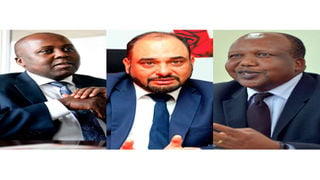
From left: Telkom Kenya CEO Mugo Kibati, Airtel Kenya MD Ashish Malhotra and Jamii Telecommunications Limited Chairman Joshua Chepkwony
|Business
Premium
Airtel, Telkom and Jamii gang up to force 29pc call tariff cut
The communications regulator has cut the rates telcos charge consumers of a rival network by 29 percent days after three mobile companies ganged up against Safaricom to push for the review, setting the stage for a drop in calling rates from next March.
The Communications Authority of Kenya (CA) on Friday said Kenyan consumers will enjoy lower calling rates after its reviews of Mobile Termination Rates (MTRs) and Fixed Termination Rates (FTRs).
In the review, the Authority has capped the MTRs and FTRs at 41 cents per minute from 58 cents with effect from March 1, 2024. The SMS termination rate of five cents per message remains unchanged. MTRs and FTRs are what operatorscharge each other to allow communication across networks.
“The new MTRs and FTRs shall apply to only local voice traffic, which means calls originating and terminating within Kenya. The new rate is informed by the prevailing economic environment, ICT market dynamics and the need to strike a balance between the promotion of investment and the protection of consumers,” the Acting CA director-general, Christopher Wambua, said.
“The revised MTRs and FTRs shall apply for a period of two years from March next year. Ahead of the new rates taking effect, all operators are required to vary their Interconnection Agreements in line with the Determination and file their Deeds of Variation with the Authority latest 1st February 2024,” Mr Wambua said.
The decision came on the same week that three of Kenya’s telecoms companies combined forces to fight market leader Safaricom over the lucrative mobile termination rates, opening a new battlefront in the industry. The three have been pushing the government to further cut MTR by 89.6 percent in what could see a drop in calling rates across networks.
Airtel Kenya, Telkom Kenya and Jamii Telecommunications Limited (JTL) had asked the CA to reduce the rate from the current 58 cents a minute to six cents.
Safaricom is the major beneficiary of the MTRs due to its leading market share in the voice business, with the telco recording a net gain from its rivals. The push for a fresh cut is based on findings of a market study the CA conducted that indicated that an MTR rate of Sh0.06 per minute is the ideal rate for the sector that allows telcos to recoup costs they incur for terminating calls from other operators in their network.
The CA last year cut the rates from Sh0.99 per minute to Sh0.58.
Airtel Kenya managing director Ashish Malhotra, Telkom Kenya CEO Mugo Kibati and JTL chairman Joshua Chepkwony last week escalated the push when they appeared before the National Assembly’s Committee on Communication, Information and Innovation chaired by Dagoretti South MP John Kiarie.
On the one side of the dispute is the three telcos who are pushing for the rates to be dropped further, and on the other is Safaricom and the Kenya Revenue Authority (KRA) who have argued that lower MTRs are leading to revenue losses.
Safaricom CEO Peter Ndegwa told MPs that reducing the rates would discourage the telco from investing in infrastructure upgrades, especially in rural areas where most customers are net receivers of calls.
Mr Ndegwa argued that the telco would be unable to adequately recover the costs it incurs to terminate calls from other operators should the MTRs be further lowered. “With low MTRs, there is no incentive to invest in network coverage especially in rural areas,” said Mr Ndegwa.
The KRA told the committee that Safaricom’s revenue from MTRs is about Sh5.1 billion and as such, further lowering the rates would reduce these earnings to Sh4.04 billion.
The taxman said it would lose about Sh647 million in Value Added Tax (VAT) annually and Sh606 million in excise duty from lower MTRs.
The ‘National Roaming, Telecommunications Tower Sharing and Termination Network Cost Study 2022’ has proposed a glide path be implemented to immediately reduce MTRs to Sh0.06 per minute.
Telkom CEO Mugo Kibati called on the CA to “do its job independently.”
“As Telkom, our understanding was that reducing the MTRs from Sh0.99 to Sh0.58 was [a] stop-gap measure and that after 12 months we would go back to the rate that was proposed by the study,” he said. The three telcos have asked Kenya to follow the path of countries such as Rwanda and India whose MTRs are zero to make calls across all networks cheaper.
MPs have promised to push for a further reduction in the MTRs, arguing that it will lower the cost of telecoms services which will bolster the government’s digitisation plan.
“Any well-meaning Kenya will be happy with a level playing field and competitive telecoms sector,” said Mr Kiarie.





